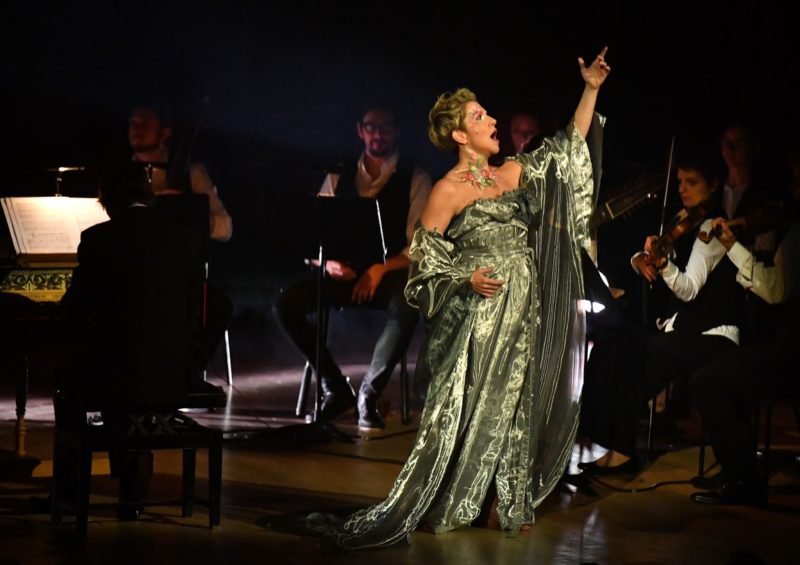JOYCE DIDONATO IN BERLIN: A HARMONY THROUGH MUSIC
If there is anybody to sing the baroque repertoire and to catch the inner, deeper sense of that music‑ the sense of inner conflict between war and peace‑ this Is Joyce DiDonato. And what is more‑ she allows anyone in the audience to feel the music and truth."
Opera World

Music can express different emotional states, as well as be a kind of commentary on a nowadays world’s events.. It has a special power, that almost every musician tries to catch and deliver to the audience. And there is one person, who actually takes up the effort to make it more real and to achieve peace through music. And, she makes you believe, that it is possible.
And it was just like this, on 30th May in Berliner Philharmonie with Joyce DiDonato and Il Pomo d’Oro. There was a concert from the tour: “War and peace, harmony through music”. But word “concert” is just insufficient. It was more than a concert, or just a “performance”. Joyce took us on a journey with mythological heroines, baroque truth and reality.
That stage reality was divided into two parts. First one- “war”, second- “peace”. The war started long before the concert. Entering the main hall, seing Joyce (siting) on the stage, looking at the man, dancer- Manuel Palazzo, lying in front of the audience.. Man out of mythology. A lost son, beloved man, suffering human… She was like if she were asking the audience, only through the eye contact, but still like asking, simply- why? Like if she was giving the audience a challenge to feel and follow the emotions, and story that will happen on the stage after a while.
And then- it begun. Il Pomo d’Oro orchestra under the baton of Maxim Emelyanychev intonates the beginning of Storge’s torment: Scenes of horror, scenes of woe.. The music rises, voice goes through every demanding passage. Sounding once- full, dark and powerfull, then- changing the mood, more soften, round, delicate. Another rise, another change. Storge suffers in front of us, looking for a relief, but cannot find it in joyjess flow the hour of light. Then another inner war. Leo’s Andromaca and her prendi quell ferro,o barbaro!. Sung in full voice, there wasn’t Joyce, standing on the stage, there was a suffering mother, Andromaca, with broken heart and longing for forgiveness. Then- a moment with Cavalieri’s Sinfonia, full of emotional outbursts and baroque strong fragility, followed by Purcell’s Chancone g-Moll Z 730. Another beautiful basso continuo motive with violin’s brightness. And right after- Dido’s floating, full of hesitation as well as desperation – Thy hand, Belinda. A deep conversation between brass and voice. The first part of the concert is coming to the end. Begun with the powerful vison of war, followed by longing for relief, now- ending with a sorrow. Gesualdo’s Trist est anima mea. An outburst of pain, suffering, followed by, the absolute pearl- Lascia ch’io pianga mia cruda sorte. The aria, that allowed Joyce to show the most fragile part of human’s sorrowful soul. Long lines, sung in delicate voice, in some parts- changing into crying, dull and full of sorrow notes. And then- just disappearing and leaving the audience with themselves, in their inner pain and amaze by the power of music and, actually, Joyce’s as well as Il pomo d’oro’s abilities and truth.
The second part was: “Peace”. Dress and lights (and projections) change. The grand opening aria They tell us that you mighty powers above. First relief trial. And once again- the long, developed, phrases and most demanding arpeggios. Sung technically as well as emotionally, on the highest level. Joyce made audience believe in her story. Like she did in the next aria- Crystal streams in murmurs flowing. The fairytale-like story, sung with a soft voice and long phrasing, with accurate trills. Roses petails- not only lying on the stage, but also appearing in the voice. Then, calming Da pacem domine, an introduction to the following: augelletti, che cantata. Here, the bird “song”- the greatest dialogue between flaute and voice. Fragile unissono and careful, light repetitions. And the last (almost) one- Kleopatra’s aria: Da tempeste il legno infranto. And here- the best conclusion of the concert, the colors of trills, passages and octave’s jumps, summing up (emotionally) with Kleopatra’s words: “torna l’anima a bear”- happiness is restored to the soul.
But there was also the final “conclusion”. As we were in Germany, Joyce deciced to leave the audience with some Strauss… And the beautiful words, that “no matter what, the next day- the sun will always rise, again”. Und morgen wird die Sonne wieder scheinen…
If there is anybody to sing the baroque repertoire and to catch the inner, deeper sense of that music- the sense of inner conflict between war and peace- this Is Joyce DiDonato. And what is more- she allows anyone in the audience to feel the music and truth. Not only because of her great technical abilities (needed for such a demanding baroque repertoire) but, what is even more- because of the sharing. Sharing the emotions, delivering the hidden messages and, actually, giving the “Peace”. And it was just like that in Berliner Philharmonie. Real tears, standing ovation and harmony through music.
More at Opera World
